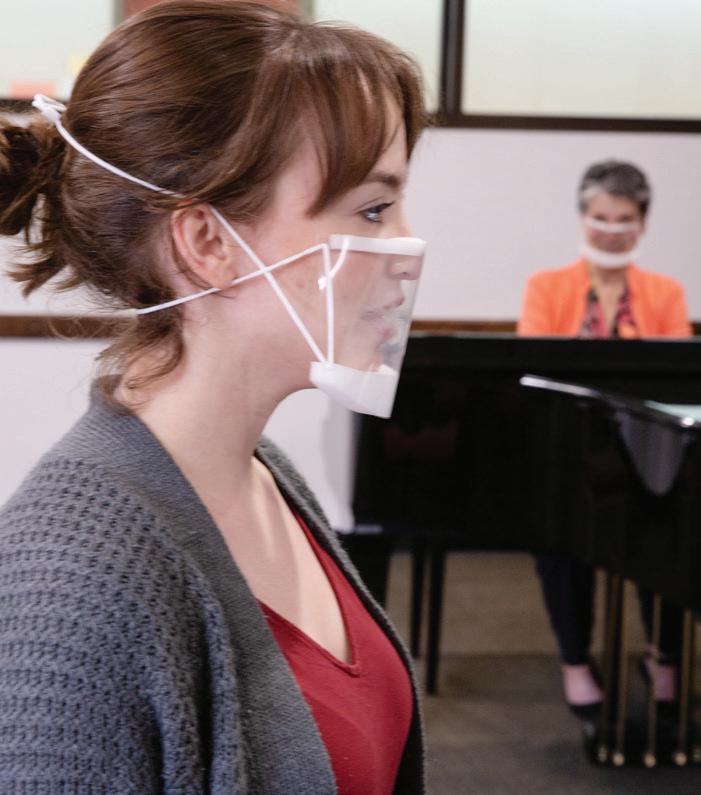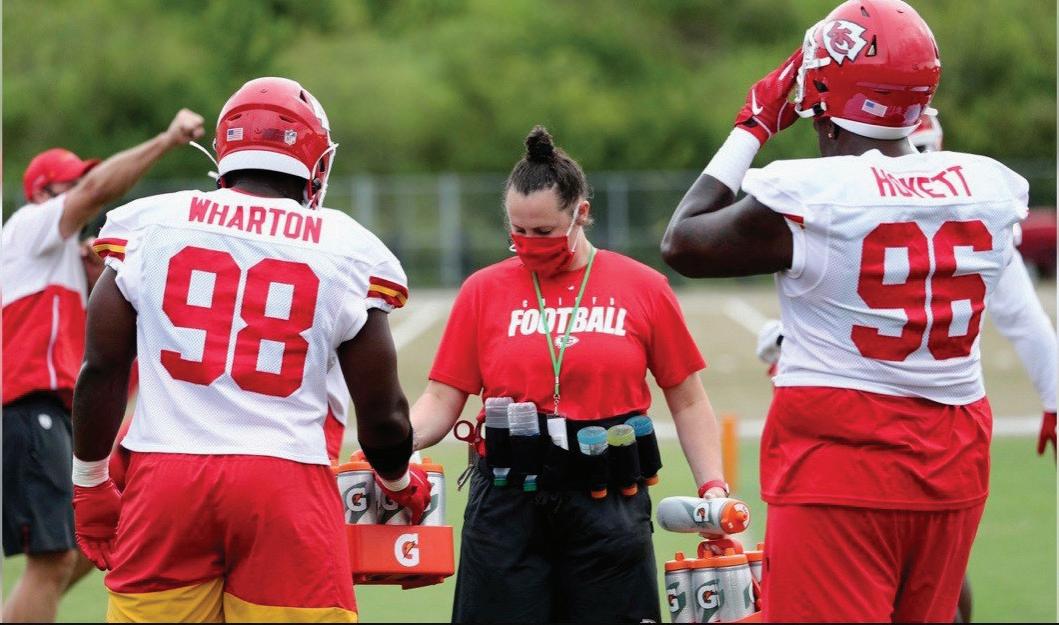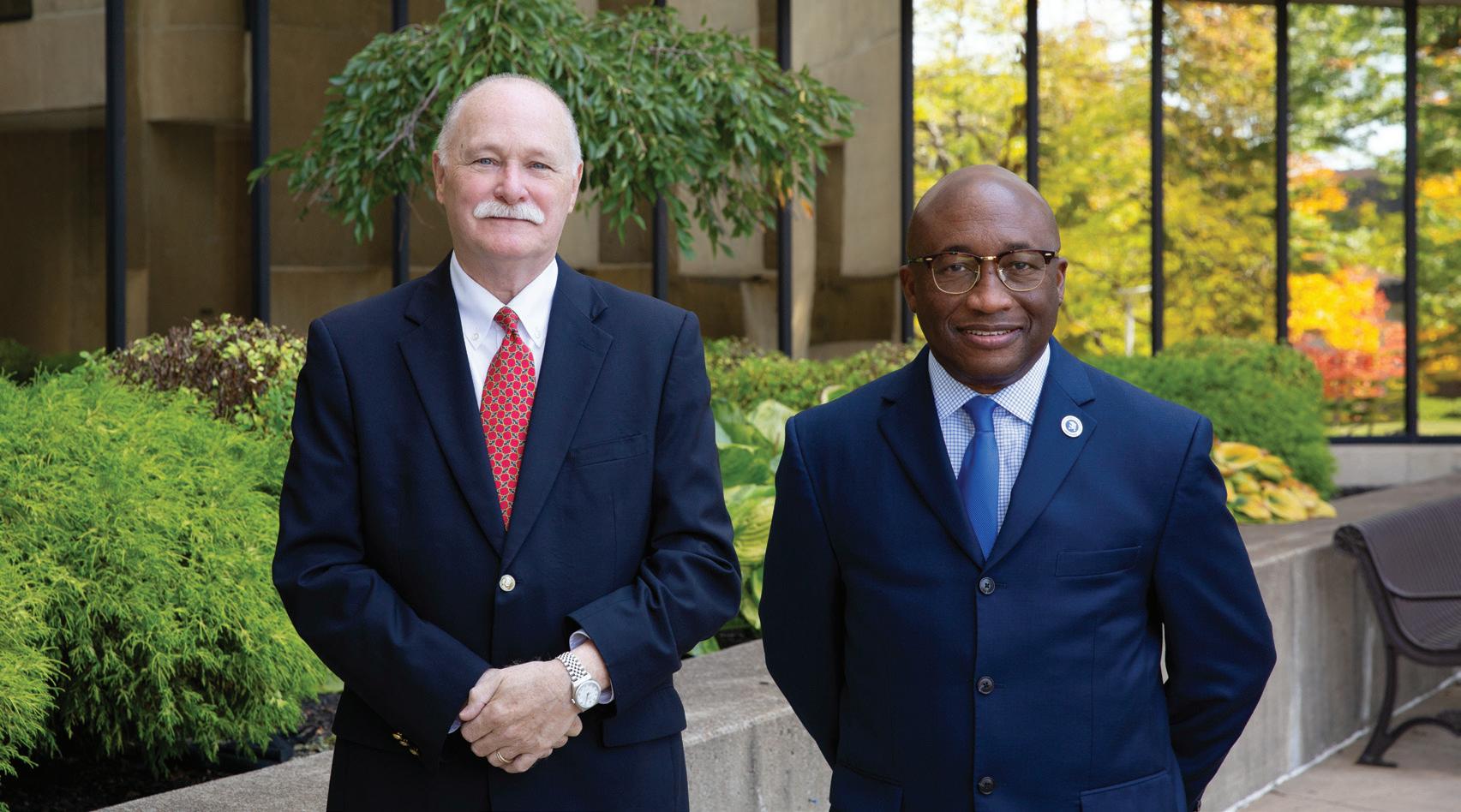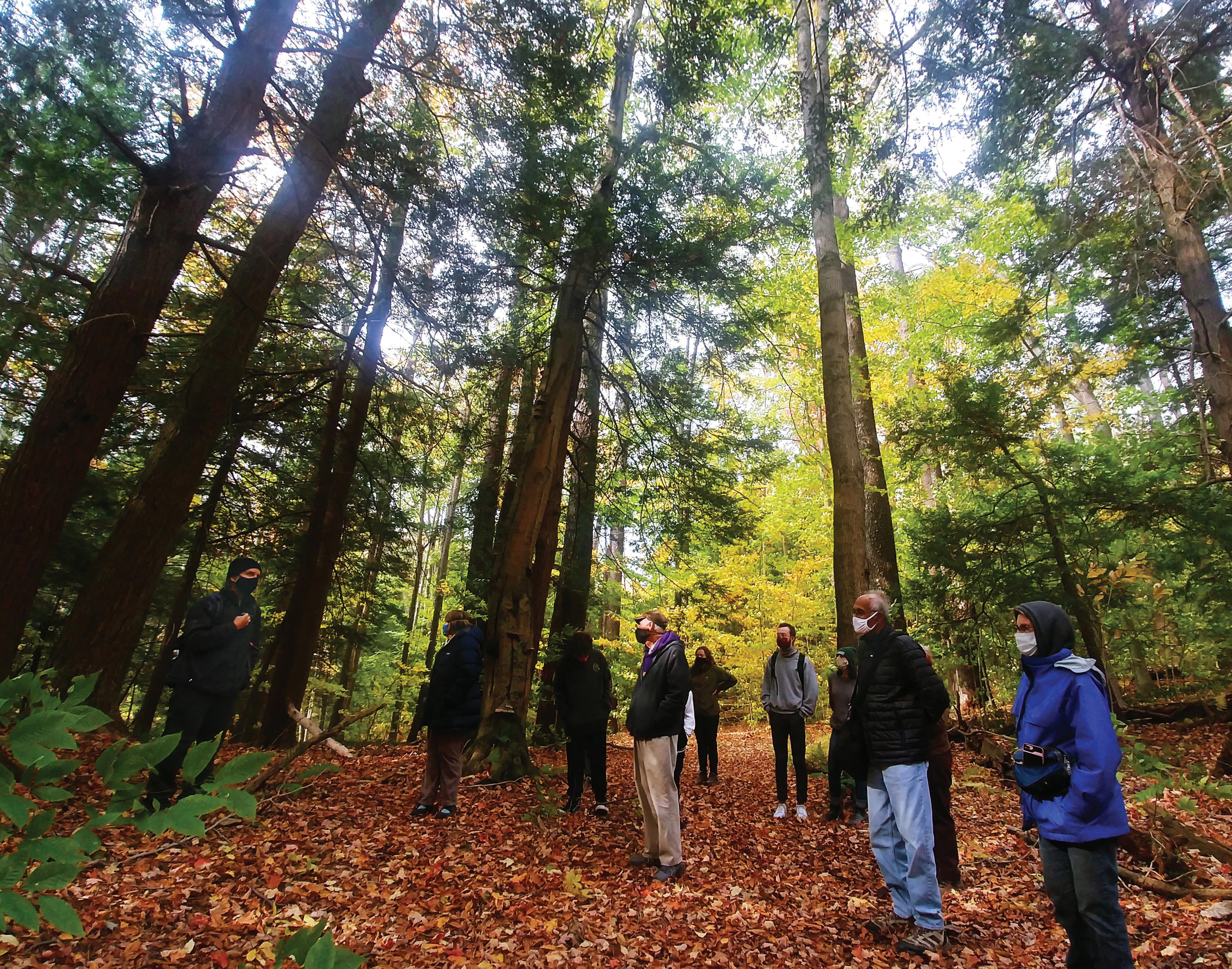
7 minute read
Musicians persevere during COVID-19 pandemic
The sights, and sounds, too, were alive and well in the School of Music in a fall semester impacted, as higher education has been everywhere, by COVID-19 restrictions.
Choral ensembles were heard rehearsing in the amphitheatre, with students wearing facial masks and spaced at least six feet apart. One-on-one lessons were relocated to full-size classrooms that became available when academic courses went online. More guest speakers than ever before addressed vital topics and trends in virtual formats.
“I’m really amazed how resilient they are,” School of Music Interim Director Daniel Ihasz said of students. “They want to be here; they are doing all that we ask them to do.” He’s likewise impressed at how well faculty adapted to changes brought on by the pandemic.
That’s in no small part due to the comprehensive re-opening strategy developed by the School of Music. “We did a lot of research in the summer; we came up with a plan that fit in with SUNY’s re-opening plan, that followed CDC guidelines,” Professor Ihasz explained. A key component was moving academic courses from classrooms to remote status, so many private lessons could continue in the classrooms that allow for social distancing.
Versatility and innovation can easily describe the School of Music’s approach to meeting students’ needs through a combination of in-person instruction, online classes and hybrid formats.
Director of Choral Studies Vernon Huff reconfigured his 36-member Chamber Choir into four manageable small groups. “Let’s turn this into a positive thing. It gives us the opportunity to work in smaller ensembles,” he said. As a result, Dr. Huff finds he’s turned into more of a coach than a conductor.
Outside singing was allowed, with social distancing and masks. Inside ensemble singing was limited to 10 people, spaced 12 feet apart, with masks, for 30 minutes at a time.
Amphitheatre hosts rehearsals
“No choir is meeting as a whole group except for outside,” Huff reported. The amphitheatre was used alternately by Huff’s Chamber Choir and Adjunct Lecturer Brent Weber’s Fredonia Camerata.
Huff followed a hybrid teaching model for his fall classes: online and an A/B model. For example, six students singing in one Mason Hall room are joined via Zoom with 12 other students, who could easily be in their residence hall rooms. “We’re all singing together,” he remarked.
Camerata rehearsals in the amphitheatre, as well as in Mason Hall, went well, Mr. Weber reported. “The general consensus is that we are just happy to be back, making music and in a safe environment. Sound is definitely different due to the larger spaces between singers, but a nice blend is coming into the mix.”
Excitement among students is obvious, Huff said. “The students are so excited to be making music again; they hadn’t since March.”
Alumni become guest speakers
Professor Christian Bernhard brought several guest teachers into MUED 394: Secondary School Instrumental Rehearsal Techniques through Zoom. “It’s a lot easier with them on Zoom to share their experiences in high school teaching,” Dr. Bernhard said. “That’s the silver lining in this pandemic.”
Guest teachers who are also alumni have been from Gowanda, Frewsburg and as far away as Albany, N.Y. “We can’t go out and visit high schools, so the teachers are coming to us,” Bernhard said. An interactive Zoom teaching session with Fredonia High School band director Andy Bennett, also an alumnus, and his students and Bernhard’s class was held.
Eleven students in Bernhard’s instrumental rehearsal techniques class met in-person, one day a week in a large Mason Rehearsal Hall room, and were joined remotely by a 12th student via Zoom. They all met on Zoom two other days of the week. During online days, students—representing brass, woodwind and percussion—were paired in one-on-one teaching/critiquing sessions where they played their instruments.
“The reaction by students, I think, has been very positive,” Bernhard said. They understand these are challenging times and they support one another.
Assistant Professor Richard Webb employed a hybrid model for MUED 251: Psychology and Sociology of Music Education. The full class met on Zoom two days a week and was divided into smaller groups on Friday. The small groups became “experts” in a new topic each week. Weather-permitting, the groups convened outside.
The cavernous King Concert Hall easily accommodated Assistant Professor Kieran Hanlon’s MUS 400: String Area Recital Seminar, so all 15 students performed together. On some days, all students assembled there, while individual sections gathered on other days.
Much of Mr. Hanlon’s teaching schedule consists of one-on-one lessons, so he installed a HEPA filter device in his office and placed social-distancing marks on the floor so private lessons continued with adjustments.
— Adjunct Lecturer Brent Weber
Students are on board
“They are seeing the big picture, and because of that, they are not getting too hung up on the fact they have to wear uncomfortable masks,” Hanlon said. Because students followed guidelines, the School of Music continued in-person activities with adjustments.
Greater use of guest speakers who examined social issues that students may encounter as professionals has been a key benefit of the virtual teaching format followed by Director of Bands Paula Holcomb.
“With an ensemble band, in order to be safe, we made the decision to go entirely remote. COVID-19 is just so dangerous with aerosols. We can only have nine people in a room for one hour, no matter the size of the room, and then the room needs to be cleared for an hour,” Dr. Holcomb explained.
“We immediately decided to make lemonade out of lemons,” said Holcomb. Ingredients in her lemonade recipe included presentations by leaders in the music world, Fredonia graduates working professionally in the field, Fredonia faculty who focus on specific areas and mock auditions.
Students learned about gender discrimination from Abbie Conant, a Juilliard-trained trombonist who waged an epic court battle—which she ultimately won—after being denied the trombone principal position in the Munich Philharmonic. Virtual discussions provided opportunities to talk about the #MeToo Movement, social justice issues and Black Lives Matter, and explore prejudice within the music world.
Chris Wilhelm, a prominent leader in the field and member of the New Jersey Symphony, served as a role model and explained how to be successful as a band director in public schools.
Nine accomplished alumni from around the country reviewed virtual mock auditions that paired two students in separate practice rooms; one performed while the other evaluated, and then the roles were reversed.
Individual lessons on track

COVID-19 restrictions had little impact on Professor Barry Kilpatrick’s teaching schedule, which is all face-to-face instruction. He utilized Diers Recital Hall for MUED 260: Brass Pedagogy and Room 1001, a tiered rehearsal space, for two classes, MUED 161: Beginning Trombone and MUED 261: Advanced Trombone, and his office for 10 one-on-one lessons.
“The mechanics of doing these courses and lessons haven't really changed much. But teaching a class in Diers, with everyone masked, has made for an amazing change—it's totally silent in the room before the class begins,” Mr. Kilpatrick explained. “In the past, with unmasked students sitting near each other in a classroom, I would have to force them to stop their chatter when the class began,” he said.
“Now I can only wish they would break the weird silence!”
With no live performances, Director of Orchestras and Opera David Rudge divided the College Symphony Orchestra (CSO) curriculum into four parts: a study of major orchestra masterworks; Performance Anxiety: The Mind/Body Connection, a mini-course which includes a number of awareness modalities such as tai chi, chi gong, yoga and meditation; a Sound Recording Technology project of “Dánzon No. 2,” by Mexican composer Arturo Márquez; and “ZoomWorks,” a series of works being written by Fredonia composition faculty for groups of CSO musicians.
Dr. Rudge said the Chamber Orchestra’s curriculum is now one of “audition preparation.” Students learn the standard excerpts that are requested for orchestra auditions and perform them over Zoom.
A mild September allowed Distinguished Teaching Professor Julie Newell to place MUS 213: Opera Seminar I students in the amphitheatre or near the clock tower. Outside gatherings and use of surgical ClearMasks were major changes Voice area faculty made so in-person instruction, one-on-one lessons and ensemble rehearsals could continue.
“I’m amazed by their maturity, their resilience, their optimism. They communicate every time I see them how much they value their education and the opportunity to be here on campus,” Newell said. “I see their smiling faces behind their ClearMasks every day.”










